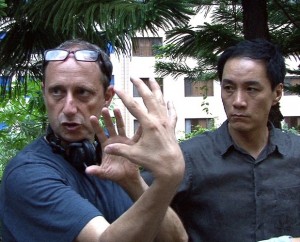An American Fish In The China Sea: ‘Unmade in China’s’ Gil Kofman Talks the Perils of Making a Film in China
GALO: You had a very interesting relationship with the production company that hired you. There seemed to be several instances where they undermined you or didn’t even acknowledge you in the casting or writing processes. As a director, was it difficult to make a good movie with this type of overseeing entity?
GK: It was. The surprises were endless, from them changing script, locations and actors at the last minute, and often without my approval, to never being paid on time. But once we started filming, immersing ourselves into the chaos of production, the control reverted back to me. As long as I met the pages and schedule, as long as the footage looked good, they deferred to me. Which lulled me into a compliant sense that things might actually work out in the very end. Unfortunately, I carried this feeling into editing the film, never once realizing that the inherent notion of “final cut” is utterly inimical to a Communist regime.
GALO: At one particularly tremulous point in the film and the production, you leave China to return stateside for your daughter’s graduation? Even though you hesitated in returning, you did, in fact, come back, and with a renewed vigor for finishing the film in the best way possible. What changed your mind?
GK: At this point, I was heavily invested in seeing it through. I had already suffered so much that I figured a little more was worth the gamble. I also wanted to finish our documentary. I guess an insatiable sense of reflexive “schadenfreude” mixed with an ingrained work ethic were involved in my return.
GALO: In the film, you reveal that you made a trip back to China so that you could bootleg your version of the film — complete with “Alfred Hitchcock Presents” and the Safari icon. What was your motivation behind this? Was it meant to be a message to your production company? Could have there been any legal issues with them by doing this?
GK: How to elaborate on this? Watch the film [laughs]. But I will say that I was repeatedly offered a festival cut throughout the shoot by the executive producer, the filmmaker’s carrot which never materialized.
GALO: You end up finding you bootlegged copy in America four months later. What was it like to see just how far your version of the film had traveled?
GK: A salmon swimming upstream.
GALO: The actual feature film that you’re making in this documentary, entitled Case Sensitive, deals with the craze of online videos and the obsession society holds over its “celebrities.” Why this subject? Did you feel it would be received well in China?
GK: Yes, we thought this could be huge in China, since the Internet is really the pulse of the new revolution there. That’s why we were so amazed when the government agreed to actually do this film.
GALO: When was the first moment that you knew this project was going to be a difficult endeavor?
GK: My suspicions and fears fossilized when I was presented with version seven of the script, although I had only done four rewrites. Mmmm, what happened in-between…
GALO: Was this movie, and the journey to make it, worth all the trouble you went through? I mean, at one point, you went on strike because you weren’t being paid. That had to have been frustrating and trying.
GK: Going through this I learned a lot about filmmaking and myself. I learned how to work with actors in a foreign language, how to direct under arduous and shifting conditions, and how to laugh at myself without diminishing the work.
GALO: What project are you working on now? I hear it will take you back overseas.
GK: A narrative film Tanner wrote and that we’re co-directing, called The White City, set in Tel Aviv. We’ve just cast some great actors and are incredibly eager to get going.
Unmade in China – trailer from Francis Krow on Vimeo.


